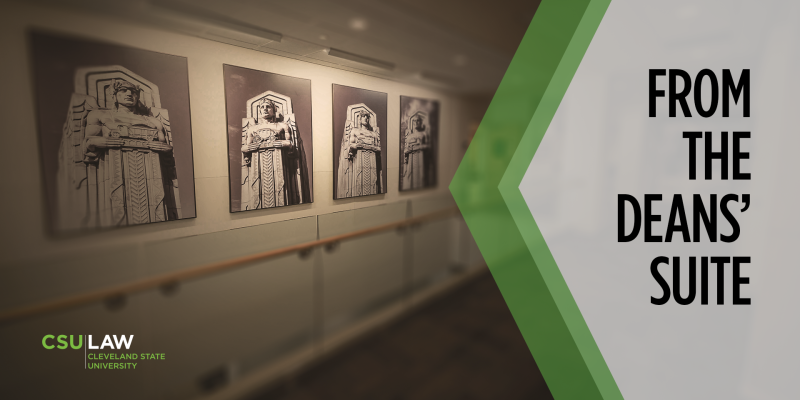
Last week showcased the many ways our faculty’s expertise, scholarship, and public engagement create meaningful opportunities for our students outside the classroom. Across events involving international law, constitutional law, environmental law, public health, and criminal justice, our faculty helped to create spaces where our students could interact with pressing legal issues and the people shaping them.
International Law at the ASIL Midyear Meeting
The American Society of International Law’s (“ASIL”) Midyear Meeting brought global scholars and practitioners to Cleveland. Professor Milena Sterio, the conference Co-Chair, presented on The Role of International, Regional, and Domestic Courts in Transitions Towards Peace and Security. She also moderated the panel on generative AI litigation. CSU Law Professors Reginald Oh and Karin Mika also participated as facilitators of research forums at the conference. Most significantly, Professor Sterio arranged for students in her International Law class to attend the conference. Students attended as active participants, engaged in professional networking, and gained firsthand insight into how faculty research shapes global legal conversations.
A Debate on the United States Supreme Court
On campus, our student chapters of the American Constitution Society and Federalist Society came together to co-sponsor a well-attended lunch program, SCOTUS Response to the Trump Administration: A Matter of Principle or Appeasement? The discussion featured CSU Law Professor Abigail Moncrieff and Professor Jonathan Adler from William & Mary Law School, and offered students a model of rigorous but respectful debate. A large group of students filled the room, underscoring their eagerness to grapple with issues that will define their generation of legal practice.
Environmental Law Conference at Ohio State
At the Ohio Public Interest Environmental Law Conference, Professor Heidi Gorovitz Robertson moderated a panel on The Public Voice in Administrative Law. Professor Robertson and CSU Law student Mark Bank presented work they did analyzing public comment for Frasier Solar’s application before the Ohio Power Siting Board. Robertson and Bank will also co-author a paper on the same topic. This collaboration exemplifies how faculty scholarship becomes a pathway for students to contribute to the academic and policy discourse.
Weaponizing Public Health: Gun Violence as a Legal and Policy Challenge
Finally, back at CSU, CSU Law’s William I. Weisberg Center for Health Law & Policy and CSU Law’s Criminal Justice Center hosted Weaponizing Public Health: The Role of Law and Policy in Curbing Gun Violence. Organized by Professors Laura Hoffman and Robert Triozzi, the program featured legal scholars, trauma physicians, and mental health professionals addressing Cleveland’s declaration of gun violence as a public health crisis. Students attended in significant numbers, hearing from experts across disciplines and witnessing how law can frame solutions to urgent social problems.
The Common Thread
These four events highlight how our faculty’s scholarship creates powerful opportunities for our students to participate in conversations that shape law and policy. We are grateful for these and countless other ways our faculty help our students to learn law and live justice.
Warmly,
Carolyn
